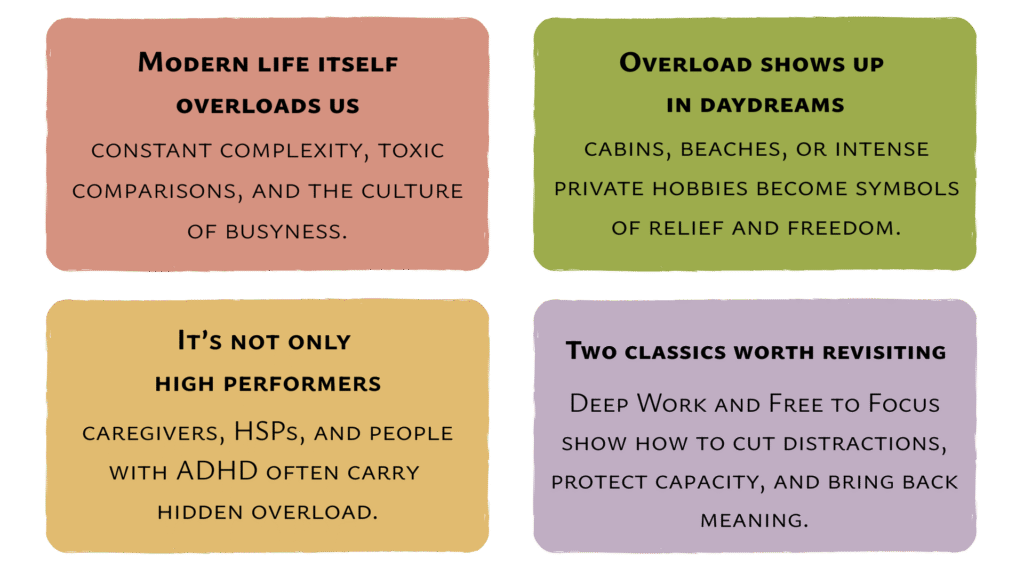F: Fact – Modern life overloads us far more than it used to
Chronic overload doesn’t just come from doing too much work. It comes from the way modern life constantly presses on our attention and energy.
- Decades ago, life was simpler. Today, almost everything is more complex: more products, more choices, more notifications, more noise.
- We often deal not with people, but with complex systems, websites, or automated AIs that demand constant navigation.
- Social networks amplify toxic comparison — there’s always someone richer, fitter, smarter, or more productive to measure against.
- Technology keeps us constantly available, pinging us with notifications that drag us away from our natural focus.
- Many companies value the appearance of busyness more than true productivity.
- And behind it all sits a cultural myth — reinforced by movies, ads, and self-help trends — that superhuman performance is what matters, not a balanced, meaningful life.
This pushes people toward hacks and tools to perform like machines — while the simple truth of listening to our own needs and impulses gets lost in the noise.
—
U: Unseen angle – Who is most affected?
Chronic overload is often invisible because it wears the mask of competence. And it doesn’t touch just one group:
- High performers — managers, entrepreneurs, senior experts, creatives — who constantly deliver more than seems humanly possible.
- Caregivers — parents of children with special needs, or those caring for aging relatives — who are endlessly occupied yet often unrecognized.
- Highly sensitive people (HSPs) and those with ADHD — whose nervous systems are already finely tuned and therefore more easily pushed into exhaustion.
What’s rarely seen: many of these people eventually develop real psychological disorders as a downstream effect of chronic overload. They are then treated — sometimes medicated — for anxiety, depression, or burnout. But the underlying environment and lifestyle that keeps the overload alive often goes unaddressed.
—
E: Extension – Daydreams of the overloaded
Chronically overloaded people often escape into fantasies. They imagine a cabin in the Canadian woods, chopping wood and breathing clean air, or a Maldives beach hut, with nothing but a hammock and the sound of waves.
These images aren’t about luxury — they’re about relief. They are metaphors for what’s missing: the freedom to act on one’s own impulses. To lean into deep work when the drive is there. To pause and rest when the body calls for it. To do light, shallow tasks when that feels natural. Not to do less overall, but to do it in alignment with an inner compass, instead of constantly adapting to an environment that only values pressure and output.
For some, this takes the form of private passions — off-road cars, martial arts, mountaineering, weapons training, flying. Activities that are often hidden from colleagues and the professional world. They are fulfilling not because they impress others, but because they belong entirely to the person. They can be picked up or set aside freely, and that freedom itself is what restores energy.
—
L: Links – Deep Work & Free to Focus
I’ll always try to inspire you with a few links to existing media. For this episode, two classics still worth revisiting:
📘 Explains why shallow tasks drain us, and how deep, focused work restores both productivity and a sense of meaning. Perfect for the moment when performance remains high but fulfillment disappears.
📘 A practical guide to cut through distraction, redefine priorities, and protect your capacity. It also shows how unbalanced competence can drift toward burnout.
—
Disclaimer
Chronic overload is not a diagnosis. It’s a framework to describe the pressure of modern life — before collapse arrives. This doesn’t minimize real struggles: if your state is worsening and life is becoming unmanageable, don’t stay only with online reading. Seek professional help. Psychological difficulties are not weakness to be hidden, but signals that show where your attention is needed.
